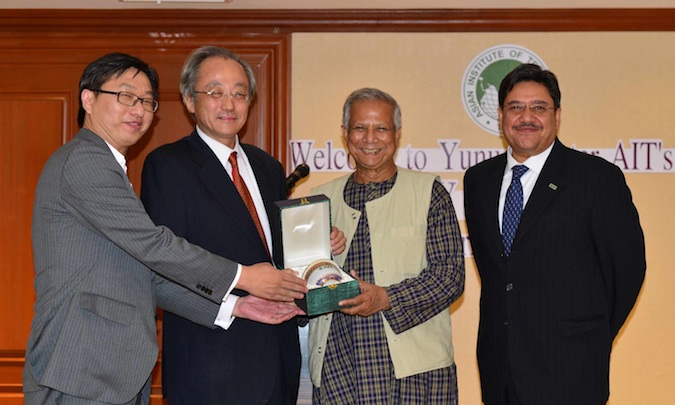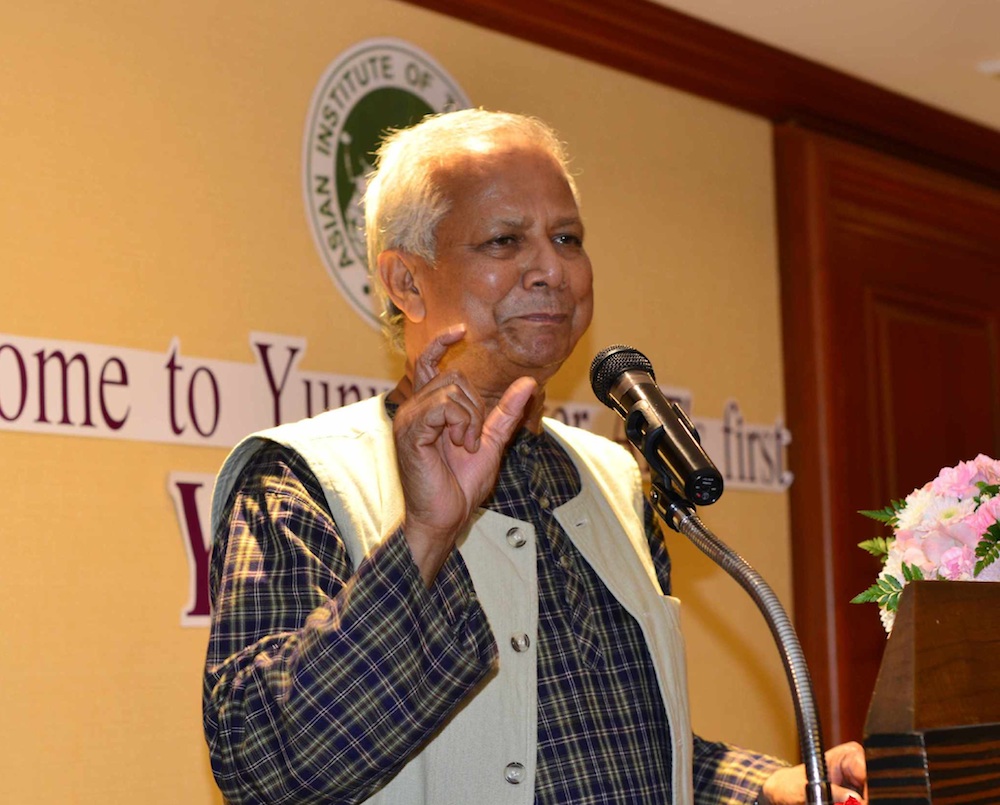The special evening brought together students, social entrepreneurs,
academics, business executives, government officials and NGO workers to
discuss the promotion of social business in Thailand.
In his keynote address, Prof. Yunus spoke about his new “Social
Business Design Lab” which is organized monthly at the Yunus Centre on
Dhaka, Bangladesh. As a co-director of the Yunus Center AIT
(YCA), which is administratively a part of AIT Extension,
Prof. Yunus said he would like to see the new initiative extended to
Thailand.
AIT Vice President for Resource Development Prof. Kazuo Yamamoto was
on hand to welcome Prof. Yunus on behalf of the Institute. He was
joined by Dr. Faiz Shah, Director, YCA; Ms. Mariana Botero, Program
Officer, YCA; and other AIT Extension staff members who organized the
event.
Nuttaphong Jaruwannaphong, Director of the Thai Social Enterprise
Office (TSEO), also attended. TSEO was established in 2010
and operates under the Prime Minister's Office. TSEO’s priority is to
stimulate cooperation among social enterprises and develop their
networks in Thailand. In addition, TSEO was designed to be in touch
with all possible entrepreneurs who have a particular interest in
social and environmental issues, and to inspire social
responsibility.
The following article was published by Thailand’s The Nation newspaper
on 21 April 2014.
Nobel laureate Muhammad Yunus urges social business development in
Thailand
By Shawn Kelly
Nobel Laureate Muhammad Yunus recently urged Thailand to push forward
with social business and also invited the country's young people to
become social entrepreneurs.
He was in Bangkok on April 10 to rally partners and potential Thai
investors to his global cause of social business. He spoke at a
networking event organised by the Yunus Centre at the Asian Institute
of Technology and the Thai Social Enterprise Office.
The economist gained fame for advancing the micro-financing revolution
in his native Bangladesh. For the first time credit was extended to the
country's impoverished masses.
Now he wants to turn popular wisdom on its head again. This time, "the
banker for the poor" aims to change the world through the proliferation
of social businesses.
Decrying the selfishness and excesses of profit-driven enterprises,
Yunus has a new vision for conducting business. According to the
website of his Dhaka-based Yunus Centre, "a social business is a
cause-driven business. It must be financially sustainable and
mission-oriented. The company must achieve its social objective and at
the same time cover all costs through a revenue model."
"The success of the business is not measured by the amount of profit
made in a given period, but by the impact of the business on people or
the environment. Investments in social businesses purely support the
accomplishment of a social objective, and an investor should desire no
financial gain."
In Thailand to promote his monthly "Social Business Design Lab", Yunus
told a small collection of executives, academics, government officials
and NGO leaders that he wants to see a social business fund develop in
Thailand. It could be similar to the fund launched in Bangladesh with
Norway's telecom giant Telenor. The initiative allows for the
incubation, financing and promotion of social businesses.
Describing a social business as a "non-dividend company created to
solve a social problem," Yunus said the model can provide employment
for the planet's countless young people lacking jobs, which is a
growing phenomenon in rich and poor countries.
By hatching an idea for a cause-driven business, a young entrepreneur
could leverage a small amount of start-up capital from social business
funds to become CEO of his own company, which could even be franchised
just like traditional profit-motivated firms.
Young people are capable of driving this movement forward as they can
be enormously powerful once they discover their life passion. They also
find it easier to form a new mind-set, which was necessary to challenge
prevailing business norms, he added.
Faiz Shah, director of the Yunus Center at AIT, said some regional
pilot initiatives are being finalised in Thailand with corporate and
public sector partners in the fields of mobile healthcare, safe
drinking water and knowledge management.
The center will also introduce Prof Yunus' Social Business Design Lab
to Thailand and other parts of Southeast Asia.
Nuttaphong Jaruwannaphong, director of the Thai Social Enterprise
Office, said the country is ready to embrace social enterprises. Key
players in the private sector want to move beyond spending on corporate
social responsibility projects.
"CSR says profit first then social progress, but social business says
social purpose comes first," he said.
Affordable housing is a sector where manufacturers could assist slum
dwellers through social business plans. By channeling their R&D
into pro-poor technologies, companies can tap into the unserved market
of one million low-income consumers who need basic dwellings.
"It's an example of using capitalism to create a positive social
impact," he said.
The companies would not lose any money and would actually gain
customers.
Creating opportunities for socially conscious investors, such as
socially responsible mutual funds and financial markets, will hopefully
take hold soon in Thailand, he added.
Shawn Kelly is Senior Media Specialist at the Asian Institute of
Technology.
READ MORE: THE STRAITS TIMES


